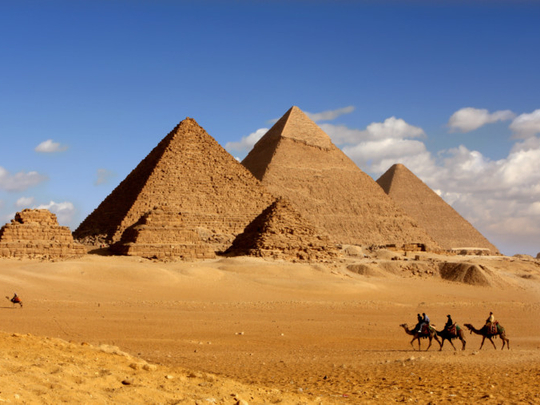Abu Dhabi: Egypt prepares to reopen all archaeological and touristic areas of the country following the Prime Minister’s resolution to allow the return of cultural tourism from 1 September, after a close of about five months from mid-March, as a precautionary measure to prevent the spread of coronavirus, local media reported, however , the government has stipulated that arrivals in the country must have a negative result in pcr control before entering Egyptian territory.
Dr. Ghada Shalaby, Egypt’s deputy minister of tourism and antiquities, said the ministry will have all controls implemented in hotels and tourist services and that all archaeological and tourist spaces in the governorates be reopened.
Luxor Governorate has announced that it will begin welcoming tourists to the Southern Governorate early next month to temples and archaeological museums, with the return of daytime tourism from Hurghada to the Red Sea Governorate.
The return of tourism to Egypt began partially last July, according to a resolution to receive tourists in the governorates of the Red Sea, southern Sinai and Matrouh, as a first step, and archaeological spaces and museums were reopened in those governorates, with a limited reopening of a limited number of archaeological sites and museums in other governorates, such as the pyramids and the palace of Baron Empain in Cairo.
100,000 tourists
The cities of Hurghada and Sharm el-Sheikh have received more than 100,000 tourists from Belarus, Ukraine, Switzerland, Hungary and Serbia, since the resumption of inbound tourism to Egypt.
Tourism staff in Luxor rely heavily on tourists from Eastern European countries, according to Tharwat Agami, director of the Luxor Chamber of Tourist Establishments.
He told Asharq Al Awsat that “these tourists enjoy beach tourism, stay there and are happy with the day’s sightseeing to make a stop at the antiquities of Luxor.”
He added that the masses of cultural tourism came from Western Europe and that the province’s tourism corporations have earned a large number of applications to start organizing cultural tourism trips in the governorate.
Agami said: “All hotels and tourist services in Luxor are able to obtain tourists, having received a certificate of physical protection more than a month ago, and are constantly inspected to ensure that they comply with fitness protocols to stop the spread of coronavirus.”.”
Egypt has launched a set of controls and situations to allow the reopening of tourist services and hotels, and stipulated that they download a certificate of fitness protection from the Ministry of Tourism and Antiquities, linked to operational tariffs, which provides symptoms of social distance., temperature controls and hygiene and fitness situations, some 700 tourist restaurants and cafes have downloaded a fitness protection certificate, from a thousand restaurants and tourist cafes that have been inspected for compliance with safety procedures, and 644 hotels have downloaded a fitness protection certificate in 21 governorates since last May , according to official knowledge published through the Ministry of Tourism and Antiquities.
Egypt’s restaurants and cafes will operate at 50% of their capacity, according to the Council of Ministers Crisis Committee resolution of 26 July, with an express number of visitors to archaeological sites.
Agami expects Luxor and Aswan to see a significant share of tourists in the next period, with the start of the tourist season in October.
Propagation limit
The resolution to resume tourism is accompanied by stricter procedures and controls to restrict the spread of COVID-19, as the Egyptian government has stipulated a negative PCR verification carried out within 72 hours for all Egyptians and foreigners wishing to enter Egyptian lands.
The number of other people inflamed by coronavirus in Egypt has decreased in the last two weeks, while Egypt recorded 111 new infections on Thursday.
Tourism is one of the main revenue resources in Egypt and in 2010 more than 14 million tourists visited Egypt, a accumulation of more than 17% compared to 2009, according to official statistics.
The January 2011 revolution caused a drop in the number of tourists, reaching 5.25 million in 2016; last year there was a resurgence and an increase in the number of tourists, which was around 10.8 million, according to a government report submitted to Parliament in the middle of last year.
Egypt aims to hit 12 million tourists this year, but the coronavirus has replaced the game.
Dear reader,
This segment is about life in the United Arab Emirates and data you cannot live without.
Sign up to read and complete gulfnews.com

